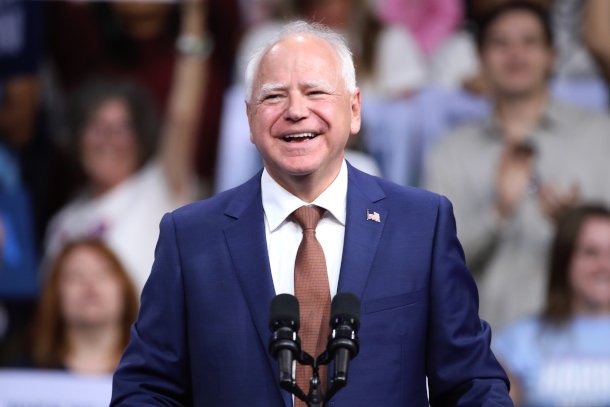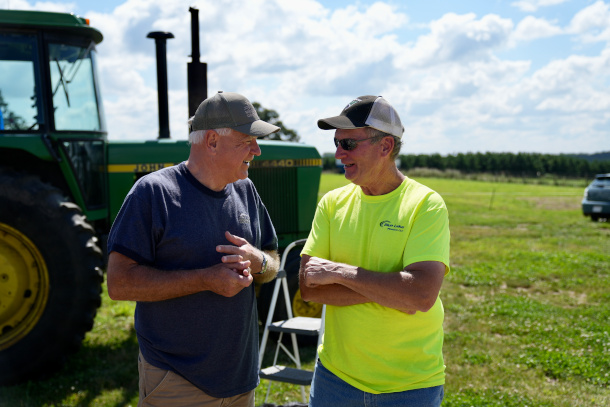Tim Walz's Climate Record
Air Date: Week of September 6, 2024

Minnesota Governor Tim Walz at a Harris-Walz campaign rally in Arizona. (Photo: Gage Skidmore, Flickr, CC BY-SA 2.0)
Tim Walz, the running mate of Democratic presidential nominee Kamala Harris, has signed climate legislation as Minnesota Governor and supported regenerative agriculture bills as a Congressman. Inside Climate News reporter Kristoffer Tigue joins Hosts Aynsley O’Neill and Jenni Doering to discuss the praise Walz has received for his climate work as well as some criticism over his history of supporting the ethanol industry and oil pipelines.
Transcript
DOERING: It’s Living on Earth, I’m Jenni Doering.
ONEILL: And I’m Aynsley O’Neill.
Jenni, as you know alongside Democratic nominee Kamala Harris is her running mate, Tim Walz. And all eyes have been on him and his record in the month or so since he was tapped as vice presidential candidate.
DOERING: Yeah Aynsley, Walz has been Minnesota’s governor since 2019, and for over a decade before that he represented the state’s historically red first district as a Democrat.
O’NEILL: And I think he’s also pretty famous for giving off this sort of “Midwestern dad”, everyman energy.
DOERING: That’s right, he was a high school social studies teacher, a football coach, and he served in the National Guard. So yeah, I would say “Coach Walz” fits the bill.
O’NEILL: But putting his midwestern dad credentials aside, we’re here to take a look at his record on climate and environment with journalist Kristoffer Tigue from our media partner, Inside Climate News.
DOERING: And Kristoffer joins us from Minnesota. Welcome to Living on Earth!
TIGUE: Hi Jenni and Aynsley, thanks for having me.
DOERING: So, let’s start with Tim Walz’ time as governor, what’s his reputation there?
TIGUE: Well, Walz is considered a climate champion among advocates for the progressive policies he passed in this state, including a 2023 bill he signed that requires Minnesota utilities to produce 100% of their electricity from carbon-free sources by 2040. He made a point of mentioning that climate win in his State of the State speech earlier this year:
WALZ: We struck a blow against climate change, putting Minnesota on a path to 100% clean energy by 2040 and leading the nation.
TIGUE: Now that law is on par with those in states that have traditionally led on climate action like California and New York. He also signed a bill that same year that was compared to the Inflation Reduction Act for its investments in a green future.
O’NEILL: What kind of investments would those be?
TIGUE: The act invested around $2 billion dollars into rebates for electric vehicles and heat pumps, incentives for schools to install solar, and funding for habitat restoration. It also created regulations for PFAS, or forever chemicals, and initiated efforts to improve agricultural practices. Governor Walz also signed legislation to streamline clean energy development that supporters say will shave about 9 months off the whole process.
DOERING: Wow. Infrastructure, EVs, and clean energy, that does sound a lot like the Inflation Reduction Act. Now, Kristoffer, since Walz is from the Midwest, what kind of relationship with the ag industry does he have?

Governor Tim Walz (left) on the Kruger Family Farm in Minnesota. Walz is seen as close to the agricultural industry because of his support for regenerative agriculture and ethanol production. (Photo: Office of Office of Governor Tim Walz & Lt. Governor Peggy Flanagan, Flickr, public domain)
TIGUE: Yeah, that’s a good question. Agriculture is a huge deal in the Midwest, which produces about a quarter of the nation’s food each year, and Walz is friendly with the ag industry, to say the least - both big ag and small-scale farmers alike. When he was in Congress, Walz served on the Agriculture Committee, where he supported bills that helped small-scale farmers compete with factory farms and incentivized farmers to adopt regenerative practices that improved soil health. Now, that’s good for climate since it allows the land to absorb more carbon dioxide.
O’NEILL: Yeah, we heard similar things from Sean Carroll of the Minnesota-based Land Stewardship Action.* He says Walz has carried similar policies forward into the Minnesota statehouse.
CARROLL: As governor in Minnesota, Governor Walz and our legislature have put historic investments into soil health programs, creating an emerging farmer office, developing a down payment assistance program to help farmers buy land. And these are policies that address the root systemic change we need in agriculture. Keep more farmers on the land and allow the farmers who are stewarding the land to earn a fair wage for their work.
TIGUE: And of course, Walz understands that connection between ag and climate.
Here he is in 2020.
WALZ: “Everybody wants that better future for their children. Everybody, I think, wants to leave something that they can be proud of. And I think it's going back to finding those sweet spots, for example, around climate change. Again, I said I represented one of the largest agricultural districts, number two in pork production, number two in Turkey's, all of those things that you would think are associated with rural America and that there might not be that emphasis. These are people that are deeply connected to the land, deeply concerned about sustainability. So, when I first went to Congress and started talking about addressing climate change, while yes, it's an existential threat, was also an incredible economic driver and a legacy issue for our children.
DOERING: Well, and Governor Walz has gotten a lot of press for his efforts to use those Midwestern food resources to improve the lives of children now. He’s supported “farm to school” programs and in 2023 he signed into law a free school breakfast and lunch guarantee.
From sustainable agriculture to clean energy, Minnesota is a consistent leader on climate solutions.
— Governor Tim Walz (@GovTimWalz) August 14, 2024
Thanks to a new $200 million grant from the EPA, we’re cutting climate pollution from our food systems – reducing our carbon footprint and ensuring a healthier, safer Minnesota. pic.twitter.com/eJ6B22m4LY
TIGUE: Yeah, but Jenni there’s a flip side to the ag industry support as well. Environmentalists have criticized Walz for his support of ethanol, which is a corn-based fuel that’s added to gasoline. Forty percent of America’s corn goes to producing ethanol.
Supporters say it’s more environmentally friendly than gasoline alone, but some research has shown otherwise. So many climate activists believe ethanol isn’t good for the environment at all and, similarly to fossil fuels, needs to be phased out.
But Walz has never asserted such a thing, and it seems unlikely he would.
O’NEILL: Ok, sounds like he’s walking a fine line there.
TIGUE: Definitely.
DOERING: Well, Kristoffer, aside from agriculture issues, what other pushback has Walz received about his record?
TIGUE: Sure, many climate activists and indigenous groups have criticized Walz for supporting tar sands oil pipelines. Specifically, he supported the Keystone XL pipeline as a congressman and, as governor, he allowed the completion of the Line 3 pipeline, which runs from Canada to Wisconsin by way of Minnesota.
DOERING: Yeah, both pretty controversial pipelines. So, Kristoffer, what does this all mean for the future of the democratic party? What kinds of policy actions in terms of agriculture and environment is a Harris-Walz administration likely to take if they win this November?
TIGUE: Well, it’s hard to say but it’s certainly strategically important for Harris to have a Vice President who can connect with the needs of rural America while also pushing for strong climate policies, both in agriculture and beyond. Like Biden in his last two years, we’re seeing Harris take a more moderate approach to climate change policy. Remember that as a presidential candidate in 2020, she supported banning fracking but has since switched her position. Walz walks that line too, especially when it comes to his support of certain fossil fuel infrastructure and the ag industry. For now, it appears that the two are adopting the platform Biden was running on and both Harris and Walz have refrained from mentioning climate policy in their public appearances since the start of their campaign together.

Kristoffer Tigue is a journalist with our media partner, Inside Climate News. (Photo: Courtesy of Kristoffer Tigue)
O’NEILL: Yeah, I know that when the spotlight was on Walz at the Democratic National Convention, I was crossing my fingers for a mention of climate or environment in his speech, but we didn’t get too lucky there, did we?
TIGUE: Yeah, that’s right. That was a bit of a theme for this year’s DNC. The environment only really made an appearance in the speech once - when Walz was criticizing his opponents.
WALZ: When Republicans use the word freedom, they mean that the government should be free to invade your doctor’s office, corporations free to pollute your air and water, and banks free to take advantage of customers. But when we Democrats talk about freedom, we mean the freedom to make a better life for yourself and the people that you love. [BIG CHEERS]
TIGUE: His speech was really more pep than policy - complete with several of his former football players appearing on stage to cheer him on. And it’s been pretty similar messaging since the convention wrapped up - which is not much. But still, top Democrats seem to be okay with this. Jay Inslee, the Democratic governor of Washington and a well-known climate hawk told the New York Times that he doesn’t mind that Harris and Walz are refraining from speaking about climate change. Those democrats believe it’s more important to draw a distinction between a Harris-Walz ticket and a second term for former President Trump.
DOERING: Well, we’ll be eager to see what else we hear on climate and environment from the Harris-Walz campaign in these very short weeks before the election.
O’NEILL: Kristoffer Tigue is a journalist with our media partner, Inside Climate News.
Kristoffer, thanks so much for joining us today!
DOERING: Thanks, Kristoffer.
TIGUE: Thank you both.
*Editor's Note: We incorrectly identified Sean Carroll when this story first ran. He is Policy Director for Land Stewardship Action, not Land Stewardship Project. We regret the error.
Links
Inside Climate News | “Climate Advocates Rally Behind Walz as Harris’ VP Pick”
Living on Earth wants to hear from you!
Living on Earth
62 Calef Highway, Suite 212
Lee, NH 03861
Telephone: 617-287-4121
E-mail: comments@loe.org
Newsletter [Click here]
Donate to Living on Earth!
Living on Earth is an independent media program and relies entirely on contributions from listeners and institutions supporting public service. Please donate now to preserve an independent environmental voice.
NewsletterLiving on Earth offers a weekly delivery of the show's rundown to your mailbox. Sign up for our newsletter today!
 Sailors For The Sea: Be the change you want to sea.
Sailors For The Sea: Be the change you want to sea.
 The Grantham Foundation for the Protection of the Environment: Committed to protecting and improving the health of the global environment.
The Grantham Foundation for the Protection of the Environment: Committed to protecting and improving the health of the global environment.
 Contribute to Living on Earth and receive, as our gift to you, an archival print of one of Mark Seth Lender's extraordinary wildlife photographs. Follow the link to see Mark's current collection of photographs.
Contribute to Living on Earth and receive, as our gift to you, an archival print of one of Mark Seth Lender's extraordinary wildlife photographs. Follow the link to see Mark's current collection of photographs.
 Buy a signed copy of Mark Seth Lender's book Smeagull the Seagull & support Living on Earth
Buy a signed copy of Mark Seth Lender's book Smeagull the Seagull & support Living on Earth

